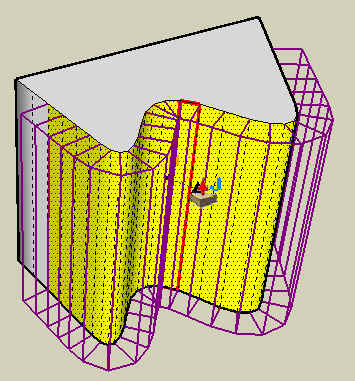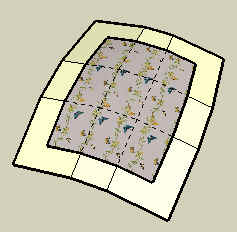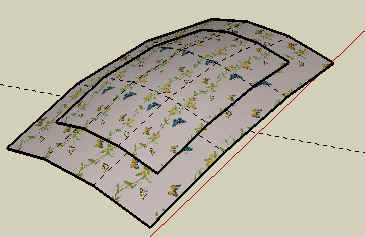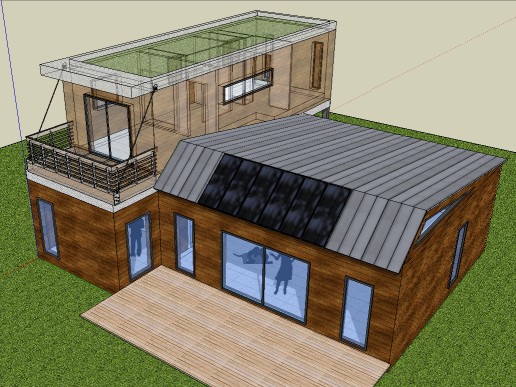This is a resurrection of the OLD version of the plugin, published in 2008 and last updated in 2011. It works in all versions of SketchUp and is certified for SU2016 and SU2017. It does NOT require LibFredo6.
Note: There is a new version of JointPushPull, called JointPushPull Interactive Edition 3.0. It includes new extrusion tools and is more interactive.
So you should consider migrating to this new version.
See this post.
Here is the link to the starting post of this new resurrected plugin.

JointPushPull Classic is a script that performs push pull on multiple faces in one operation. Unlike the native Sketchup push-pull tool, JPP Classic can maintain the continuity of the offset surfaces (mode joint push pull). This is useful to thicken non-planar surfaces.
JPP also includes two additional modes: Vector and Normal working with multiple faces.


[attachment=0:3upnsc38]<!-- ia0 -->Tutorial Joint Push Pull Classic - English - v1.1 - 20 Feb 08.pdf<!-- ia0 -->[/attachment:3upnsc38]
- Language: English, French, Spanish (Defisto), Italian (Defisto / COSEDIMARCO)
- Menus: by default, it is installed in Tools > Join Push Pull. There is also a Joint Push Pull menu in the selection contextual menu when one or several faces are selected
- Icon toolbar: Joint Push Pull (5 icons are available)
- The plugin is free, for private and commercial usage.

Although the plugin is obsolete now, this old version is published on the Sketchucation PluginStore under the name JointPushPull Classic.
IMPORTANT: This version can co-exist with the NEW version JointPushPull Interactive.
It is advised to
The footprint in the SU Plugins Directory must be:
- Fredo6_JointPushPullClassic.rb file
- Fredo6_JointPushPullClassic folder
In case you had the old JoinPushPull v2.1 already installed on your computer, it is advised to remove:
- the folder JPP_Dir_21
- the file jointpushpull.rb
- the file LibTraductor.rb
CAUTION: NEVER rename or move files from their folders. If you are unsure of your unzip operation, do it in a neutral folder and check that you reconstruct the right footprint. Then transfer the folders and files to the SU Plugin Directory.

- Select one or several objects (faces, edges, groups or components). Only faces are taken into account.
- Click on the icon of one tool, for instance Joint Push Pull
- Pick a face and gently move the mouse to visualize the offset in wireframe. Keep SHIFT pressed to skip inferencing
- You can type the offset value in the VCB (in model units)
- Type TAB to access options (thickening, continuity parameter, etc…)
- When OK with the parameters, Double-click or press Return to launch the calculation
- The calculation cannot be interrupted. On large models, you may thus get a blank screen for the time the script is computing. Do not panic, just wait, it may take several minutes!
JPP also includes 2 additional buttons:
- Undo - reselect faces (as precisely the original faces could have been erased)
- Redo last Push Pull, allowing executing the last push pull on a new set of faces, with the same parameters.

version 2.2a - 26 Apr 17: same as version 2.1a but certified for all SU version, including SU2017. Published on PluginStore as JointPushPull Classic
version 2.0b - 17 Jul 11: same as version 2.0a but with Italian translation. This version does not work beyond SU13.
Here is the file, just in case
See [url=http:http://forums.sketchucation.com/viewtopic.php?f=323&t=6708&p=342359#p342359]http:http:http:http:http:http:http:http:http:http:http:http:http:http:this illustration[/url].
version 2.0a - 16 Jul 11: refix a bug signaled by Thomthom for some complex shapes (typically with vertices having 5 edges or more). Version 1.9 had some problems left.
version 1.9a - 12 Jul 11: fix a bug signaled by Thomthom for some complex shapes (typically with vertices having 5 edges or more).
version 1.8a - 01 May 11: Better respect of specified distance now working when doing a Joint Push Pull with an imposed plane direction. See discussion in [url=http:http://forums.sketchucation.com/viewtopic.php?f=15&t=36403&view=unread#p325069]http:http:http:http:http:http:http:http:http:http:http:http:http:http:this thread[/url].
Here is the previous version, just in case
version 1.7a - 25 Apr 11: Fix a major bug (causing a freeze of SU in some situations).
version 1.6 - 22 Apr 11: Updated the algorithm to better respect the value of the offset when the surface is composed of sharp angles. THIS VERSION HAD A FREEZE PROBLEM.
version 1.5 - 02 Sep 10: maintenance release for SU8
- Suppress some warning (though harmless) messages in the Ruby console
- JPP now installs itself as an extension of Sketchup (can be disabled / enabled via the Windows > Preferences > Extension dialog
- Spanish translation - Thanks to Defisto
12 Jun 10: stable version, with encapsulation of calculation to skip some known problems on texturing.
Tutorial Joint Push Pull - English - v1.1 - 20 Feb 08.pdf
 ton", parce que les caractères accentués sont codés sur 2 octets au lieu d'un. Et Ruby n'a pas de méthode pour convertir de l'UTF8 en Unicode.
ton", parce que les caractères accentués sont codés sur 2 octets au lieu d'un. Et Ruby n'a pas de méthode pour convertir de l'UTF8 en Unicode.


